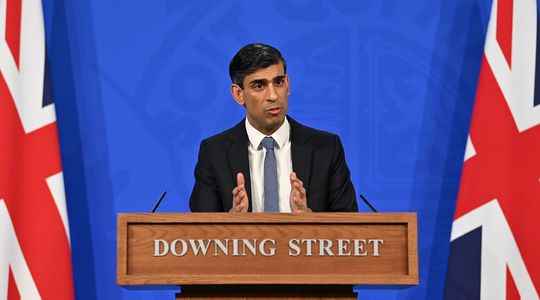London resolved on Thursday, May 26 to introduce a tax on the profits of the oil giants to finance billions of pounds of aid in the face of the soaring cost of living, after having refused to do so for weeks. These announcements come the day after a damning report on multiple watered parties in Downing Street in full confinement which again weakens Prime Minister Boris Johnson, decided to turn the page.
Finance Minister Rishi Sunak unveiled in Parliament a 15 billion pound aid package for the most disadvantaged households, in the face of inflation at its highest in 40 years, at 9% over one year in April. One in five Britons say they can no longer make ends meet, according to a Yougov poll released Thursday. Soaring food and energy prices, aggravated since the beginning of the Russian invasion of Ukraine, are expected to get even worse in October when the cap on energy prices will be raised sharply in the United Kingdom. Rishi Sunak said in Westminster that thanks to these measures, the most modest Britons “will feel the weight (of inflation) easing”.
According to a statement from the UK Treasury, “almost one in eight of the UK’s most vulnerable households will receive at least £1,200 this year, including a one-off £650 cost of living payment, increase in the minimum income (Universal Credit) of 400 pounds and a doubling of the reduction on energy bills”. In total, with the measures estimated at 22 billion pounds already announced, the total aid for “the cost of living for low-income households reaches 37 billion pounds this year”, notes the Treasury. These measures will be financed in particular by a “temporary tax of 25% on energy profits for oil and gas companies, reflecting their extraordinary profits” since the start of the war in Ukraine.
It should make it possible to raise 5 billion pounds, according to the Treasury, which specifies however that it could be largely reduced thanks to a “super reduction” if the energy giants targeted invest in new sources of energy. “Companies will generally receive 91 pence (tax credit) for each pound invested”, details the Treasury. The exceptional tax does not currently apply to energy companies, contrary to certain press reports of the last few days, but the government “is in consultation with the sector (…) and will urgently assess the extent of the (their) extraordinary profits to take the appropriate measures”.
“It was time”
The Labor opposition sneered on Thursday at this apparent about-face, after several months of persistent refusal by Boris Johnson’s Conservative government to tax the oil “majors” for fear of discouraging investment in the transition to carbon neutrality and security. energy, echoing the arguments of the sector. “It was about time,” said Sam Nadel, director of government relations at Oxfam, an anti-poverty NGO. However, he added, “the energy price crisis is a grim reminder of our over-reliance on fossil fuels. We should strengthen our energy security by investing in our abundant renewable resources which are forms of affordable, safe and clean energy”.
For the environmental NGO Greenpeace, the tax on the profits of the hydrocarbon giants is insufficient and should have reached 70%, which would have allowed “not only short-term support but also housing improvements to ensure that they use and waste less energy, and keep bills lower for years to come.” Michael Hewson, an analyst at CMC Markets, laments “a crumbling energy policy that changes direction more often than the wind”.
While the government is now calling on the oil and gas sector for investment ‘to support the UK economy, jobs and energy security’, he notes, ‘this was not the case a year ago , otherwise the investments in the (oil projects) Cambo and Jackdaw (in the North Sea) would have already been approved”.
